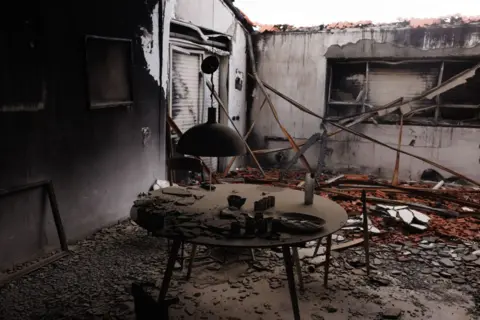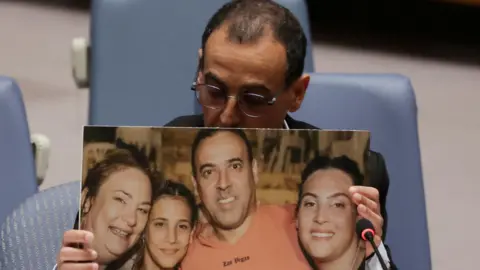‘It was very tough but I love life’ – ex-hostage whose family were killed on 7 October
“I’m Trying to Be Positive”: Former Hostage Rebuilds Life After Losing Family in Hamas Attack
A former Israeli hostage, Eli Sharabi, whose wife and daughters were killed in the Hamas attacks of 7 October 2023, says he is “trying to be positive” as he continues to rebuild his life after 491 days in captivity.
Sharabi, 53, became one of the most high-profile hostages after gunmen stormed into his community of Kibbutz Be’eri. He was released in February 2025, only to learn that his wife, Lianne, and daughters Noiya (16) and Yahel (13) had been shot dead on the day he was taken.
“When they weren’t there to greet me, I realised the worst had happened,” he recalls. “I cried for a few minutes, then I told myself—crying won’t bring them back. I needed to stand up and hug my mother and sister.”

Captivity in Gaza’s Tunnels
Sharabi describes the horrors of his captivity in Hamas’ tunnel network: starvation, abuse, and months spent tied with ropes and later iron chains.
“You need to beg for food, water—permission even to breathe,” he says. “For six months we got one meal a day, sometimes just a piece and a half of pita bread. Starvation was the worst… you eat crumbs off the carpet.”
He lost 25kg before being freed in a televised handover where Hamas paraded him on stage.
Despite the abuse, he clung to a promise he made to his daughters: “I told myself, I’ll come back—with hands or without, with legs or without. I believed from the first moment I would survive.”
Campaigning for Peace and Hostages
Since his release, Sharabi has become a vocal advocate for peace and for the remaining hostages—20 are still alive, according to Israeli estimates. He has addressed the UN and met US President Donald Trump, who played a role in his release.
Trump and Israeli Prime Minister Benjamin Netanyahu have since put forward a 20-point peace plan, calling for:
- An immediate halt to fighting
- The release of all hostages within 72 hours
- The exchange of hundreds of Palestinian prisoners in Israel
Hamas, however, has signalled it may reject the deal.
Sharabi is deeply worried. “Every day the war goes on, the hostages’ lives are at risk. War is awful—people on both sides suffer—but we can’t forget who started this.”

Living With Loss
Sharabi still hopes Hamas will return the body of his brother Yossi, who was also held in Gaza, for burial. He also remembers his friend, Alon Ohel (24), still missing in captivity.

Despite his grief, Sharabi insists his family’s memory gives him strength:
“Yossi, Lianne, Noiya and Yahel are with me every day, every moment. But they are alongside my life—not instead of it. I don’t have the privilege to stay in bed and cry. My family and friends fought for me for 500 days. It’s unacceptable to give up now.”
He has written a book, Hostage, to ensure his story is not forgotten. Lianne, an avid reader from Bristol, had once told him he didn’t read enough. “I think she would be proud,” he says.
When strangers call him a hero, he demurs: “It was very tough, but I really, really love life… I’m working on being positive.”
Source: BBC News




